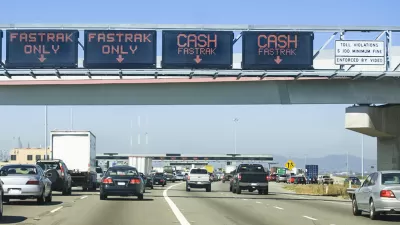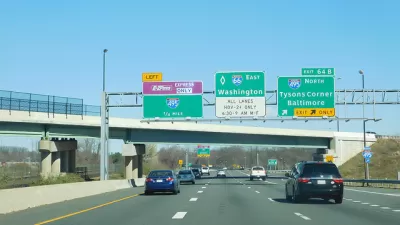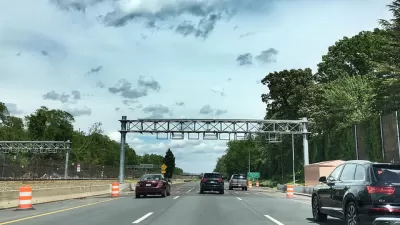Two things motorists detest: tolls and congestion. Tolls, if effectively applied, lessen congestion, but at a high cost to drivers. However, steep tolls also provide a political incentive to "fix the bottlenecks," as shown by the 66 Express Lanes.

Another lesson from what may be America's best example of roadway congestion pricing, where tolls topping $40 (one-way) do occur on occasion, particularly when the subway breaks down.
Max Smith, WTOP’s Northern Virginia transportation reporter, writes that construction has begun to add an additional lane "to ease a chokepoint that helps drive up toll prices on Interstate 66 inside the Capital Beltway...Those frequent traffic jams are a significant driver of the morning toll prices for solo drivers using the highway."
Unlike all other high occupancy tolls (HOT) lanes adjacent to general purpose (unpriced) lanes in the United States, all lanes on the 66 Express Lanes become HOT lanes during the peak hours in the peak direction, so motorists can't escape the congestion, nor the toll unless they carpool ride a motorcycle.
The operator of the 66 Express Lanes, the Virginia Department of Transportation (VDOT), may also be more politically sensitive to criticism than private operators, such as Transurban, an Australian company which built and operates the 495 and 95 Express Lanes in Virginia. VDOT has been attempting to reduce the tolls, without capping or refunding them, as some legislators demand, by tweaking the toll pricing algorithm.
Average tolls on 66 Express Lanes
While those $40+ tolls make headlines, they are not the norm. Smith reported on Aug. 20 that "[f]rom the time tolling began Dec. 4 through the end of June, the overall average paid by each toll payer each morning is now $8.39, with the average in the afternoon now at $5.21."
Tolls are higher in the morning than the afternoon largely due to the chokepoint at the Dulles Connector Road, where traffic can frequently slow...
Which brings us back to where we started, as this is the stretch that's being widened.
Smith also reported that the violation rate, i.e., motorists who don't have transponders (E-ZPass) and face penalties on top of tolls, is 13.5 percent.
While the 66 Express Lanes are unique due to the all-HOT Lane design, they are similar to other HOT lanes in that a large percentage of users are not paying tolls because these are, after all, carpool lanes. Unlike other HOT lanes, there is no toll-exemption for electric vehicles.
Overall, more vehicles paid to use the road in June with a regular E-ZPass or an E-ZPass Flex in toll paying mode (44.2 percent) than rode free with an E-ZPass Flex switched to HOV mode to indicate the driver had at least one other person with them in the car (42.3 percent).
Related 66 Express Lanes posts:
-
Capitalism at Work on an Interstate Highway, June 12, 2018
-
Popularity of Express Lanes Spreads Beyond Virginia, April 3, 2018
Hat tip to IBTTA Smart Brief.
FULL STORY: I-66 widening work on choke point that drives up tolls begins

Maui's Vacation Rental Debate Turns Ugly
Verbal attacks, misinformation campaigns and fistfights plague a high-stakes debate to convert thousands of vacation rentals into long-term housing.

Planetizen Federal Action Tracker
A weekly monitor of how Trump’s orders and actions are impacting planners and planning in America.

In Urban Planning, AI Prompting Could be the New Design Thinking
Creativity has long been key to great urban design. What if we see AI as our new creative partner?

Cal Fire Chatbot Fails to Answer Basic Questions
An AI chatbot designed to provide information about wildfires can’t answer questions about evacuation orders, among other problems.

What Happens if Trump Kills Section 8?
The Trump admin aims to slash federal rental aid by nearly half and shift distribution to states. Experts warn this could spike homelessness and destabilize communities nationwide.

Sean Duffy Targets Rainbow Crosswalks in Road Safety Efforts
Despite evidence that colorful crosswalks actually improve intersection safety — and the lack of almost any crosswalks at all on the nation’s most dangerous arterial roads — U.S. Transportation Secretary Duffy is calling on states to remove them.
Urban Design for Planners 1: Software Tools
This six-course series explores essential urban design concepts using open source software and equips planners with the tools they need to participate fully in the urban design process.
Planning for Universal Design
Learn the tools for implementing Universal Design in planning regulations.
Appalachian Highlands Housing Partners
Gallatin County Department of Planning & Community Development
Heyer Gruel & Associates PA
Mpact (founded as Rail~Volution)
City of Camden Redevelopment Agency
City of Astoria
City of Portland
City of Laramie




























